Consumer prices in China have risen to their highest level in more than two years, as government economic policy makers meet to tackle the problem.
China's statistics bureau says higher food prices pushed China's inflation rate to 5.1 percent in November, up from 4.4 percent in October.
The data comes as national economic policy makers meet in Beijing to discuss how best to tackle rising prices.
Chinese consumers have been complaining about more expensive food, with some vegetable prices, including those of ginger and garlic, rising in November more than 60 percent from a year ago. The government blamed the increase on bad weather and the rising costs of pesticide, labor and transport.
Quick, aggressive steps needed
Economist Stephen Roach of the investment bank Morgan Stanley Asia says Chinese authorities need to take quick steps to deal with inflation.
"The biggest challenge is striking a balance between the near term threat of inflation and the medium term imperative of changing the economic growth structure toward a more consumer-led system. My advice is move quickly and aggressively to deal with inflation," he said.
As a way to curb rising prices, authorities have been trying to reduce excess money in its financial system - an offshoot of a lending spree last year and of prevailing low interest rates. On Friday, China's central bank ordered banks to hold more money as reserves as a way to limit lending, the sixth such directive this year.
Higher interest rates
China also raised interest rates for the first time in nearly three years in October, and economists expect another hike soon. This is another way to limit the amount of money in circulation.
At least one city in China, Kunming, has imposed price ceilings on basic necessities at retailers, including Wal-Mart.
Overall, food prices rose 11.7 percent last month. The U.S. fast food giant McDonald's, which has more than 1,000 restaurants in China, also raised prices by as much as one yuan or 15 cents last month.
China's Inflation Highest in More Than Two Years











